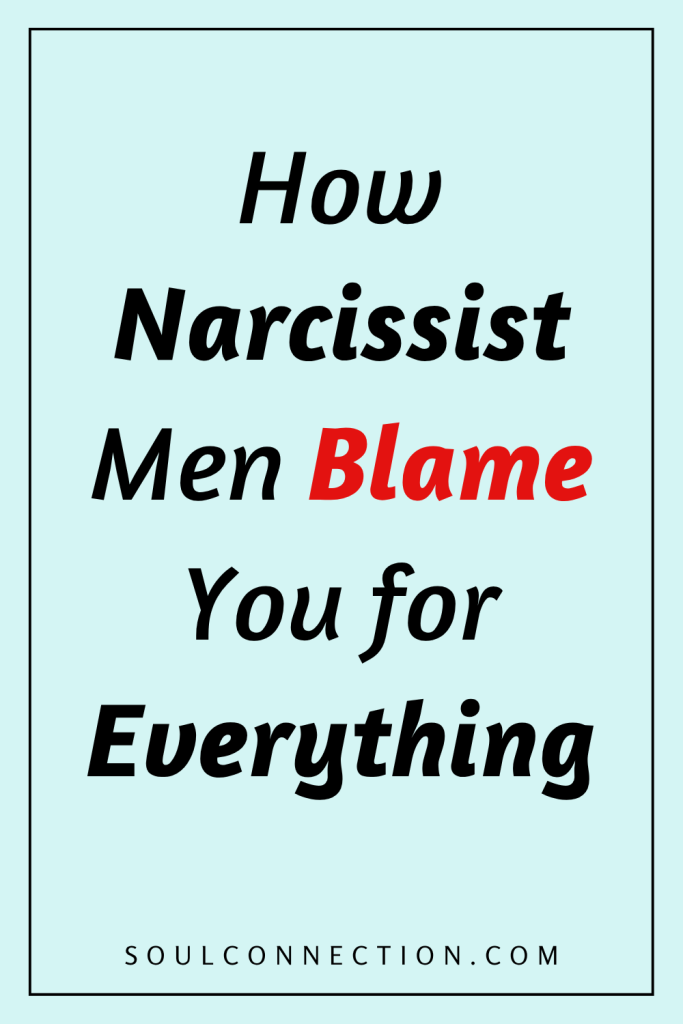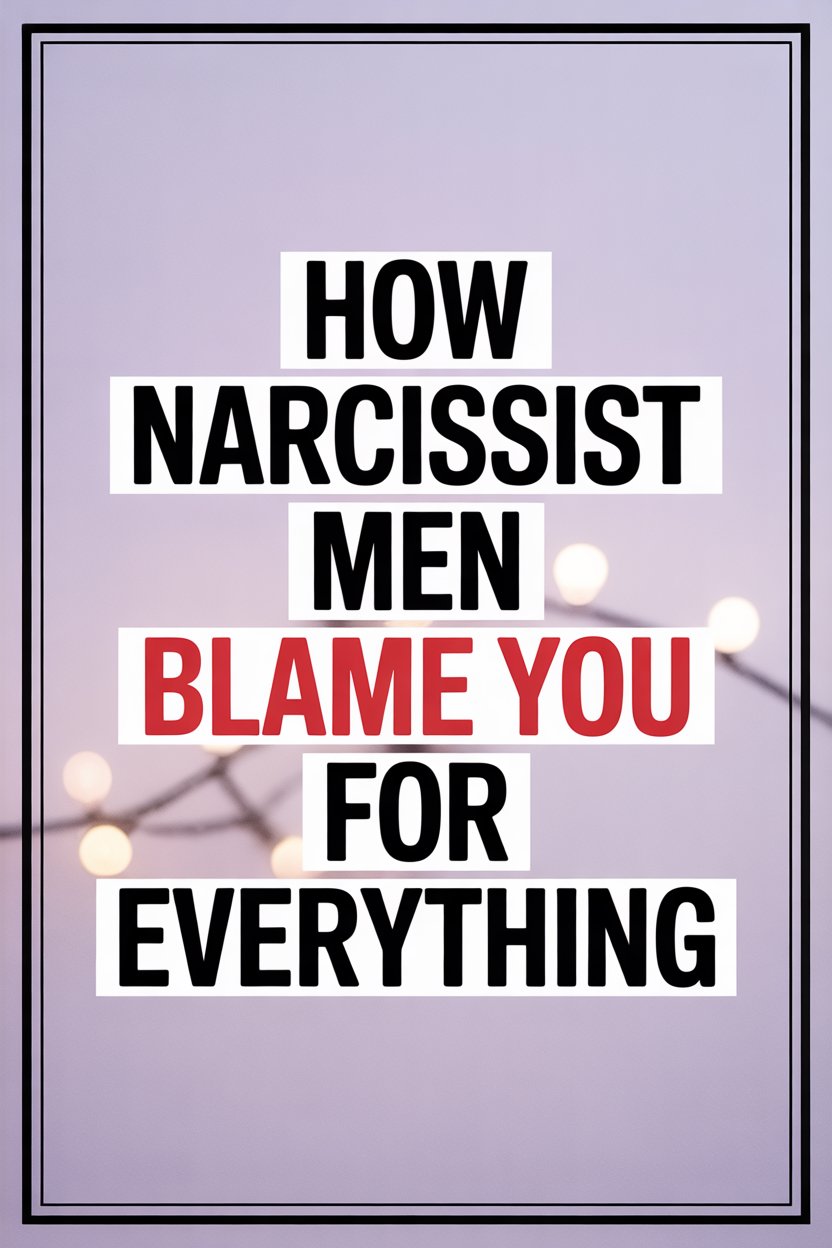Ever felt like you’re starring in a soap opera, except no one handed you a script and your love interest seems permanently allergic to accountability? Congratulations, you may be dating a narcissist.
No need for applause. If you find yourself apologizing because he forgot your anniversary, or somehow it’s your fault the sun set too early, you might be familiar with the Olympic-level sport of blame-shifting.
Let’s unpack how narcissist men manage to make everything about you—especially the blame—and what you can do about it without needing a PhD in emotional gymnastics.
The Blame Game: Narcissist Edition
Handing out blame is practically a hobby for narcissists. When anything goes sideways—burnt toast, lost car keys, a global pandemic—it’s somehow due to your failings.
Narcissist men wield blame like a boomerang: no matter who threw it, it comes right back at you.
Why? For them, admitting fault is akin to confessing they’re not actually perfect. And if there’s anything worse than being wrong, it’s letting you think you might be right. The horror!
Gaslighting: Now You’re the Villain
Ever stumble out of an argument so dazed you’re not sure if you need a nap or an exorcism? Gaslighting is the narcissist’s favorite magic trick, and the ultimate method of blame redistribution.
They’ll rewrite history—sometimes mid-sentence—until you’re doubting your own memory. Suddenly, you’re apologizing for being upset, while he looks on like a benevolent king forgiving a peasant.
Was that thing he said really so cruel, or are you just too sensitive? (Spoiler: it was, and you’re not.)
The Martyr in the Mirror
Few things are more impressive than a narcissist’s ability to become the victim in any scenario.
Lost your cool after the 12th passive-aggressive jab? He’s heartbroken by your lack of compassion. Point out a repeated pattern of hurtful behavior? Poor soul, he’s just “trying his best.”
This victim routine serves two purposes: it lets him wriggle out of owning up, and if you’re especially empathetic, you’ll rush to comfort him instead of holding him accountable.
Emotional pickpocketing, at its finest.
Projection: His Faults, Your Problem
Why deal with your own flaws when you can simply assign them to someone else? Narcissistic men are world-class projectionists.
If he’s dishonest, suddenly you’re the one who can’t be trusted. If he’s insecure, you’re “always so needy.”
It’s a defense mechanism, but also a nifty way to avoid self-reflection. Before you know it, you’re defending yourself against accusations that feel like they came out of a parallel universe.
Shifting Goalposts: The Rules Change, You Always Lose
Ever notice the target keeps moving? One day, you’re told you don’t care enough. The next, you care too much. If you’re quiet, you’re giving the silent treatment. If you speak up, you’re hysterical.
Narcissists specialize in impossible standards.
These moving goalposts mean you never quite measure up, and he always has a reason to blame you—for not anticipating his needs, for misunderstanding his words, or for failing at a test you didn’t even know you were taking.
The Silent Treatment: Blame by Omission
Silence speaks volumes, especially when it’s weaponized. The narcissist’s sulk isn’t just about being moody. It’s an unspoken accusation: You did something wrong, now figure it out and fix it.
This technique leaves you scrambling to solve a mystery you didn’t create. The discomfort is designed to get you groveling for forgiveness, even if you’re not sure what crime you committed. Detective hat not included.
Triangulation: Starring Third Parties
When all else fails, narcissists love bringing in a supporting cast. Suddenly, you’re hearing what “everyone says” about you.
Maybe it’s his mother, a mate at work, or an ex he’s mysteriously still texting—someone else supposedly agrees you’re at fault.
Triangulation amplifies the blame. Now it’s not just him—it’s the world conspiring to point out your flaws. Feels a bit like a reality show, minus the prize money.
Apology With a Catch (or None at All)
Ever get an apology that sounds suspiciously like another accusation? “I’m sorry you feel that way.” “I’m sorry you misunderstood.” Not exactly the stuff of Hallmark cards.
If you wait for a narcissist to genuinely say, “I was wrong,” you’ll be waiting longer than a British summer.
And when apologies do come, they’re often laced with a fresh batch of blame—somehow, your reaction is at fault for his original offense.
The Blame Cycle: Lather, Rinse, Repeat
Pattern recognition isn’t just for crossword enthusiasts. Narcissists thrive on repetition.
The cycle is familiar: something goes wrong, it’s your fault, you apologize, things are briefly rosy, until the next crisis—also yours to own.
This rollercoaster isn’t accidental. The constant blame keeps you off-balance, questioning yourself, and far less likely to challenge the status quo. Confused people are easier to manipulate, and narcissists know it.
Why It Feels So Personal
Anyone caught in this blame vortex can start believing they really are the problem. Empaths and people-pleasers are especially vulnerable—always trying harder, fixing themselves, and keeping the peace.
The narcissist’s greatest trick is isolating you from your own sense of reality. If you’re feeling constantly at fault, exhausted, or like you’re losing yourself, it’s not because you’re broken.
You’re just caught in a very sophisticated blame trap.
What You Can Do Tonight
Spotting these patterns is half the battle. Next time blame comes flying your way, pause before catching it.
Ask yourself: Does this accusation actually match my behavior? Or does it sound suspiciously like it belongs on his highlight reel?
Set boundaries—even small ones. “That’s not how I remember things.” “I’m not comfortable with how you’re speaking to me.” Sure, he may react theatrically, but you’re not auditioning for a drama series.
Reach out to someone who knows you well and isn’t afraid to be honest. Sometimes, we need a reality check from outside the narcissist’s echo chamber.
If the blame game is constant and exhausting, consider whether it’s worth playing at all. Not every relationship is salvageable, especially when one person refuses to own their part.
Reclaiming Your Sanity
Nobody deserves to be the designated scapegoat, especially not by someone who’s allergic to accountability. A healthy relationship includes mutual respect, shared responsibility, and the odd shared dessert.
Should you recognize these patterns in your own relationship, remember: it’s not your job to absorb someone else’s shame, anger, or inability to self-reflect. You can opt out of the blame game.
The world won’t end, though a narcissist may protest otherwise.
Time to step off the merry-go-round of blame and rediscover your own script.
Trust yourself, set boundaries, and don’t forget—sometimes the real plot twist is putting yourself back in the starring role.


